Canon C70 Overview
Cinema Capture in an RF-Mount, Mirrorless Form
The Canon EOS C70 Cinema Camera blends Cinema EOS tools with a compact, mirrorless-style body. It features a Super35 DGO (Dual Gain Output) sensor that delivers up to 16+ stops of dynamic range for highly nuanced images. This is the first Cinema EOS camera with an RF mount, making it compatible with Canon’s fast, reliable RF lenses featuring advanced coatings and optical stabilization. The DGO system enhances saturation in bright areas while reducing noise in shadows, ensuring crisp, balanced visuals.
Canon Super35 Dual Gain Output (DGO) Sensor
The Super35 DGO sensor captures a wide dynamic range with low noise by combining two readings for every pixel. One reading optimizes saturation for highlights, while the other reduces noise in shadows. This advanced process ensures sharp details, natural colors, and smooth tones in both bright and low-light scenes.
DIG!C DV7 Image Processor
Canon’s DIG!C DV7 image processor takes the extensive raw information captured from the imaging sensor and processes it for output. The DiG!C engine is also the driving force behind features such as high frame rate recording, Dual Gain Output (DGO) Sensor, Dual Pixel Autofocus, HDR (PQ) output, Electronic Image Stabilization, and proxy recording.
Canon Log 2 and 3; PQ and HLG Recording
The C70 supports Canon Log 2 for the widest dynamic range and maximum post-production flexibility, and Canon Log 3 for faster workflows with a slightly reduced range of 14 stops. For HDR delivery, PQ and HLG formats ensure accurate color reproduction and seamless integration with modern HDR pipelines.
Highly Adaptable Shooting Style
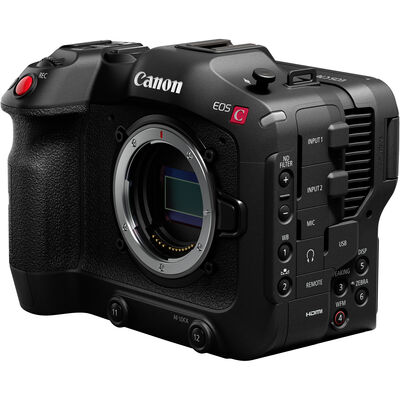
RF Lens Mount
- A built-in RF lens mount lends the Canon C70 compatibility with Canon’s expanding line of high-performance RF-mount lenses.
- With a short flange distance, the RF mount helps to noticeably reduce the camera body’s depth, resulting in a more compact design.
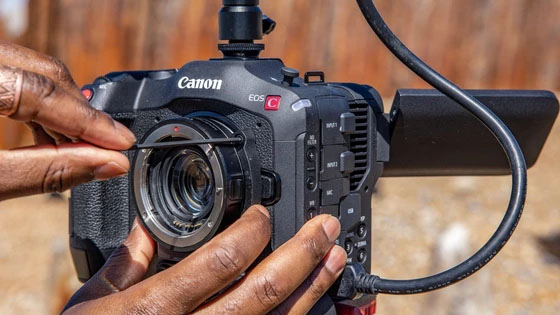
EF Lens Compatibility with Optional Adapter
Pair with the optional EF-EOS R 0.71X adapter for EF lenses, gaining full Dual Pixel AF support and a one-stop aperture boost.
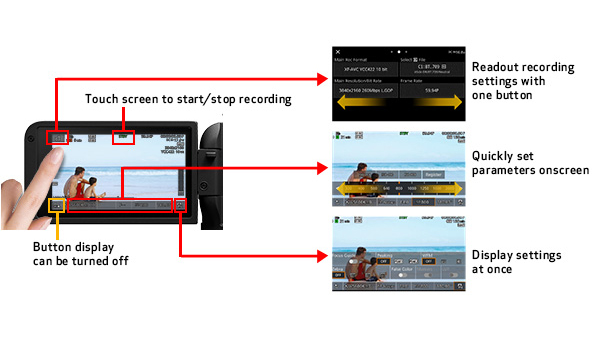
Direct Touch Control
The 3.5″ fully rotatable LCD touchscreen lets you quickly adjust ISO, iris, white balance, and more. With a single hand, you can control settings even during active shooting.
9 x 16 Vertical Capture
Use the 1/4″-20 tripod thread built into the grip to position the EOS C70 for vertical use when capturing images for digital signage or mobile device use. For easier viewing, the user interface can also be switched for vertical use.
Professional Design Features
Compact Design
The compact EOS C70 features a lightweight design with a built-in ergonomic grip. This smallest of the EOS bodies has two top shoe mounts and comes with a detachable handle and a mic holder.
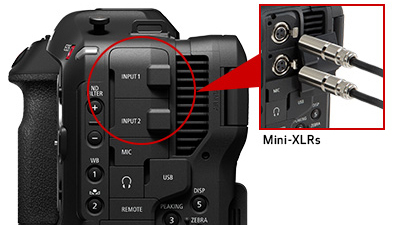
Mini-XLR Audio Inputs
- Two mini-XLR inputs with phantom power and manual control dials provide professional audio recording options for the EOS C70
- The EOS C70 supports up to 4-channel audio using dual mini-XLR ports, an internal stereo mic, and a 3.5mm mic input
Built-In ND Filters
Designed specifically for the EOS C70’s short flange distance, a thin motorized ND filter unit enables users to quickly select up to 10 stops of neutral density – an especially handy feature for ENG shooters or when shooting in quickly changing lighting conditions.
Timecode Input/Output
A BNC connector on the front of the EOS C70 enables users to input and output timecode, making synching on multicamera shoots easier.
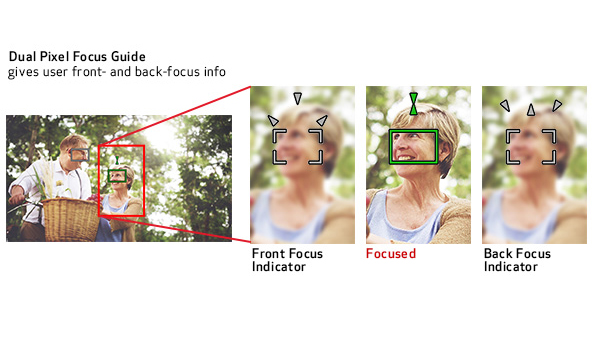
Dual Pixel CMOS Autofocus with Touch AF and Face Detection
- The Dual Pixel CMOS AF system delivers precise and responsive focusing by using every pixel for both imaging and phase detection. The deep-learning-based EOS iTR AF X algorithm ensures reliable face, head, and eye detection, even when subjects move or turn. Manual operators benefit from the Dual Pixel Focus Guide, which provides clear front- and back-focus indicators for perfect pulls.
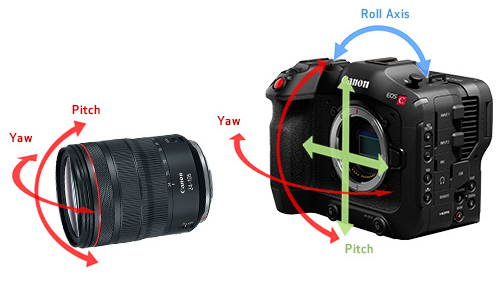
EIS with Coordinated Control
- For smooth handheld footage, the electronic image stabilization (EIS) works in harmony with RF lenses’ optical IS. This coordinated control significantly reduces shake. In 2K modes, Super16 Digital IS uses peripheral sensor data to further stabilize the image.
Auto ISO/Gain Control
The Auto ISO/Gain function, powered by the DGO sensor, adjusts exposure smoothly in real time. This allows you to focus on composition and framing without manually changing exposure when moving through variable lighting environments.
Advanced Workflow Optimization
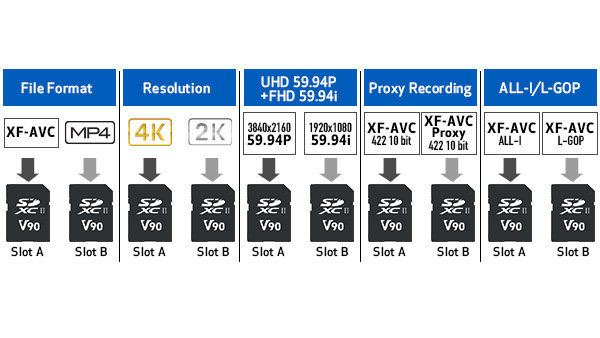
Dual SD Card Slots / Multiple Recording Options
Dual SD card slots on the EOS C70 enable simultaneous recording in different formats including 4K/HD and XF-AVC/MP4 options. The EOS C70 can also capture still photos when on standby in select video modes.

Standard and High Frame Rate to 4K 120p
Record smooth slow-motion footage with 4K up to 120 fps or 2K up to 180 fps, with Dual Pixel AF maintaining focus even on gimbals or drones.
Log2/3 and Cube LUT Support
For greater flexibility during post-production, this camera also offers Canon’s Log 2 and Log 3 gamma modes, both of which provide an expanded dynamic range with excellent tonal reproduction for highlights and in low-light areas of your images. The EOS C70 also supports .cube 3D LUTs so you can get the most accurate color reproduction on both the LCD and your external viewing monitors
4K/2K Long GOP Support
The Canon C70 supports the higher-compression Long GOP for longer recording times at rates up to 4K60p. The inter-frame Long GOP compression detects differences between frames by referring to preceding and subsequent frames.
Firmware Updates
Winter 2022 Update
With this firmware update, you’ll be able to add the latest codec, eye and face detection, and audio metering, as well as streaming, gamma, and LUT support options to your cine-style capture. Efficient intra-frame compression choices now include 4K60p XF-AVC capture and new 24p 240 Mb/s, 30p 300 Mb/s, and 60p 600 Mb/s bit rates. When using a 64GB card, you can now record up to 35 minutes at 24p and up to 14 minutes at 60p.
Livestreamers haven’t been neglected—support for Canon’s XC streaming protocol enables camera control with the optional RC-IP100 controller and easier development of third-party collaborations. Imaging tools have been updated with enhanced midrange contrast and an emphasis on accurate skin tones using Canon 709 gamma and LUT options. Off-speed shooters will appreciate eye and face detection in slow-/fast-motion modes; and last but not least, 4-channel audio levels can now be viewed onscreen to help you obtain optimal sound quality.
Product Reviews
0.0
Rated 0.0 out of 5
0.0 out of 5 stars (based on 0 reviews)
Excellent0%Very good0%Average0%Poor0%Terrible0%
There are no reviews yet. Be the first one to write one.



![Canon EOS 800D [ Kit 18-55 IS STM ] BLACK](https://cameratk.com/wp-content/uploads/2022/10/Canon-800D-BODY-768x768-1-300x300.png)

![Canon EOS 250D [ Kit18-55mm III ]](https://cameratk.com/wp-content/uploads/2022/10/CANON3-2-300x300.jpg)









